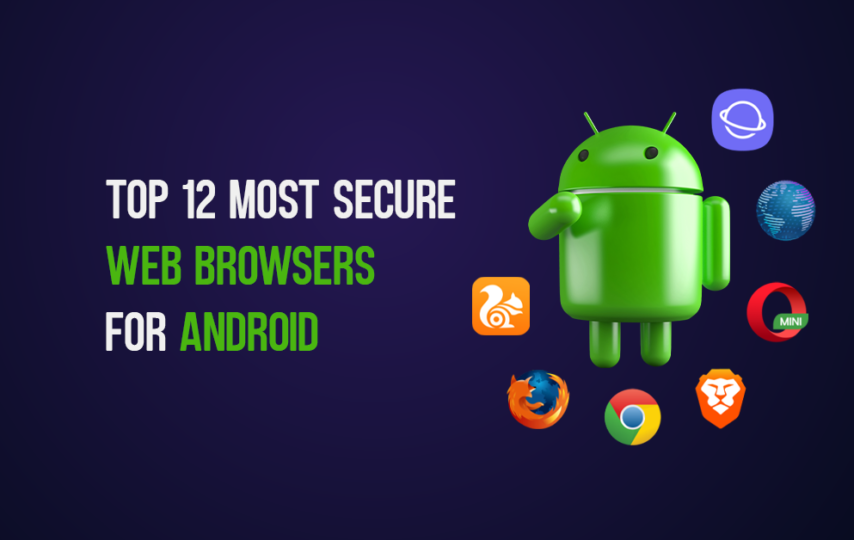For the most part, we use pre-installed browsers on our phones. However, like with practically anything in the Android world, other alternatives provide a better experience in some way.
It is not a secret that websites, advertisers, ISPs, government organizations, and other third parties track every click you make. It is possible to secure your identity online and reclaim your right to privacy and security by using secure Android browsers intended for personal data security. A decent privacy browser does not save cookies, frequently blocks trackers, and occasionally blocks advertising.
Top 12 Android Web Browsers
There are numerous such secure Android browsers to select from, and having too many options might be overwhelming, so we’ve handpicked safe browser for Android for your consideration:
- Brave
- Firefox
- DuckDuckGo
- Cake
- Epic
- Vivaldi
- Kiwi
- Puffin
- TOR
- Opera
- Google Chrome
- Any browser with a VPN
- Brave – Unlike most web browsers for Android, the new Brave browser is notable for being a private web browser that does not generate money by gathering your data. Brave uses an advertising model focused on user privacy and improves its browser by depending on aggregate user data.
Aside from its reputation for privacy and being a safe browser for Android, Brave is also notable for natively containing capabilities that otherwise would require the installation of an extension. The browser includes an ad blocker, HTTPS Everywhere, and a cryptocurrency wallet. Brave synchronizes data across all your applications, including its cryptocurrency wallet. The browser offers anonymous surfing through a native Tor connection and is the first to implement the decentralized HTTPS alternative IPFS.
If you’re concerned about your internet privacy, any of these security methods should provide some relief. These security features also speed up online page loading compared to other browsers.
Highlights:
- Fast and memory-efficient
- Ad-blocker and crypto wallet built-in
- Privacy-based advertising model and rewards
- Firefox – Firefox is an excellent all-around privacy and security browser. It has privacy protection features, customization options, outstanding security, and regular updates from its active development team. Firefox is not the most safe browser for Android out of the box but can be tweaked and toughened. Firefox has the ability to utilize a variety of browser extensions to improve your privacy and security.
Firefox allows you to disable third-party trackers and content in private and public browsing modes. Private surfing on Firefox means the browser doesn’t save information about where you’ve gone, clicked, or looked. Private browsing leaves fewer digital fingerprints, revealing less about what you do and where you browse on the internet.
Highlights:
- Open source code
- Active development with frequent updates
- Support for numerous browser extensions
- DuckDuckGo – DuckDuckGo is likely the most basic browser in this list as it lacks desktop sync compatibility, extensions, and advanced capabilities. Tracking scripts, on the other hand, are blocked by default, and the browser assigns a privacy rating to each site, along with a complete list of all blocked trackers. At this point, most browsers have some form of tracking protection. However, DuckDuckGo presents the information in a very straightforward manner. DuckDuckGo deletes cookies when you close a tab by default, but you can disable this for your favorite sites.
Highlights:
- Easily accessible weather data, extra tools for developers, loan calculators, and more.
- No search result profiling or targeting.
- Cake Browser – Your web browser serves as your gateway to the internet. As a result, how your browser acts and handles data can significantly impact your overall privacy, making it a safe browser for Android.
Web browsers designed to save your web browsing history can return you to a page you have previously visited easily. They also allow businesses to leave cookies on the computer to track you. Cake Browser aims at the mobile market by combining existing and unique features to provide consumers with more control over their data and a better surfing experience. Cake automatically alerts websites you visit that you do not wish to get followed. Cake’s built-in ad and tracker blocking keep you from viewing annoying adverts while also speeding up your browsing.
Highlights:
- A mobile web browser that is speedy and easy to use.
- Effectively organizes data and enables faster searches.
- Epic Browser – The Epic browser’s design philosophy is that all privacy settings should get enabled by default, making it a contender for secure android browsers. It will immediately submit “Do Not Track” requests, block cookies, advertisements, data-tracking site analytics services, and search using DuckDuckGo. You can change the browser’s settings to improve its convenience at the expense of your privacy and security.
Epic takes this approach seriously, delivering on their promise of “extreme privacy”: no auto-syncing, no spell-check, no auto-fill, and no plug-ins – these and many more functions are either disabled by default or just unavailable. It also does not save your browsing history, login information, databases, or other information. It does not save links for auto suggestion when typing in an address and does not cache your browsing data. The browser also prevents RTC calls from revealing your IP address.
Epic also performs proxy searches across its servers and automatically prioritizes SSL connections. It also tracks how many cookies it has banned and who attempted to send them, making your privacy top-notch.
Highlights:
- Requests each website you visit not to track you.
- When enabled, the one-click proxy masks your IP address and encrypts your browsing.
- Vivaldi – Vivaldi works just like any other browser. However, if you want to encrypt your data while browsing, you’ll need to use a Private Window. All cookies and temporary files won’t get saved when you are in a Private Window. While they are open, all private windows will be in the same session.
Vivaldi stores your cookies or cache elsewhere to better separate them, which helps keep your surfing free of private browsing cookies. Vivaldi bans third-party cookies by default in Private Windows to increase your security. If you want to disable this feature, you may do so under Settings. Aside from that, Vivaldi does not keep track of your History in Private Windows.
Highlights:
- Productivity tool and feature availability
- Option to save all of your data locally
- Easy-to-use and highly customizable user interface
- Kiwi – Kiwi presently uses Chromium version 101 and is more frequently updated. If you’re coming from Chrome, the Kiwi user interface will feel right at home.
There are a few interesting new features, the most significant of which being support for Chrome desktop extensions, which enhance the experience. Furthermore, a dark mode can force websites to adhere to the theme – a boon if you frequently use your phone in low-light circumstances. Other features include native ad blocking, a bottom address bar, and language translation.
Highlights:
- Extensive privacy options, including the ability to hide content and prohibit screenshots in Incognito mode.
- Effective Ad and Pop-Up Blocker
- Puffin – Puffin browser is a well-known private browser with a good reputation. What distinguishes it from other browsers is how it renders web pages.
A typical browser submits a request (for example, clicking to view a webpage), and a server sends the data in the form of a code folder. The browser then renders that code, presenting the user’s page.
Puffin does things a little differently: because they’re a cloud-based browser, web pages get rendered in Puffin’s cloud area, rather than your browser receiving data and then rendering it directly from the website’s servers. Puffin acts as a barrier between you and the internet, making it easier to protect yourself against viruses.
Highlights:
- Advanced remote browser technology gives all of the perks without compromising safety.
- Zero Trust Architecture ensures complete remote browser isolation.
- TOR – Tor Browser is the most secure browser for Android. However, it is slower than other competitors. Tor is an acronym for “The Onion Routing,” which conceals your IP address by routing all online traffic across numerous encrypted servers. This means your computer’s communication must first bounce between servers on Tor’s secure server network before it can access a website.
Tor conceals user activity from ISPs, protecting it from hackers and trackers. One of the downsides of this browser is its prohibition in some countries that regulate the internet to provide users unrestricted access to the internet.
While Tor Browser is safe, its onion routing mechanism will slow down your internet connection – just like a VPN, when your traffic gets bounced off numerous servers, your connection speed suffers. Tor browser, on the other hand, can be ideal for you if you have a good internet connection or don’t mind giving up a little bit of speed for excellent security.
Highlights:
- It grants servers and websites anonymity.
- Lets you access restricted websites.
- Opera – Opera is based on the Chromium operating system and includes several security features to make your web browsing experience safer, such as fraud, virus protection, and script blocking. Furthermore, it provides updates every 4 or 5 weeks.
Opera also claims to provide a free VPN service through their browser. However, it is not a VPN and does not provide full system-wide encryption. Additionally, your data is collected when you use the Opera browser and its “free VPN” feature. If you do not use a premium option, you may suffer a slower experience with a reduced level of protection. Overall, Opera appears to be a viable option for some consumers.
Highlights:
- Ad blockers block Cryptomining scripts as well.
- Google Chrome – Google Chrome first appeared on Windows in 2008, but it has since evolved to include Mac and Linux computers and iOS and Android smartphones and tablets. Chrome is a safe browser for android that helps prevent harmful or inadequately secured websites from opening on your browser. Websites that employ the Do Not Track feature cannot track the length of time a user spends on any specific page. This feature also prevents the website from tracking your behavior, including the type of information that interests you.
Highlights:
- Set your data to get deleted automatically.
- Password encryption on the device
- Any browser with a VPN – Your traffic fingerprint and IP address are what websites use to follow you. On its own, a VPN can help block both of these things. As a result, you’d be free to use any browser you want, and the only thing anyone would see is that you’re using a VPN. VPNs also have the advantage of working with any app, not just the browser. There are plenty to select from, but only a few are decent. Look for a VPN with a strict no-logging policy and other privacy features. A free Android VPN App can transform any browser into a great private web browser.We choose SPL VPN because it offers a free, unlimited version and best-in-class privacy features with a strict no-log policy.
Conclusion
If you want to use the internet safely and securely, it is imperative to use a safe browser for Android. Because everyone’s needs are different, it’s difficult to propose the “best” and most secure browser for Android. We hope these suggestions present you with a place to start!
Remember that no browser is entirely secure! Each of them has its own set of advantages and disadvantages. We strongly advise using these Android web browsers in conjunction with VPNs and other security technologies to boost your online security further!
Also Visit: Power BI: Complement Your Data Analytics Skills With A Power BI Certification





